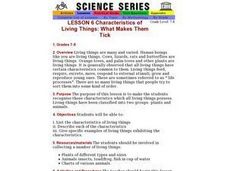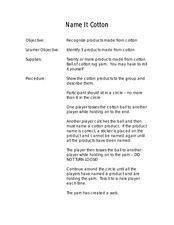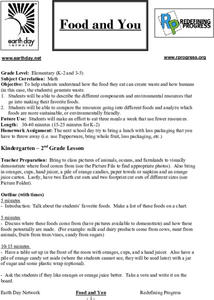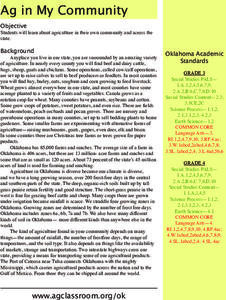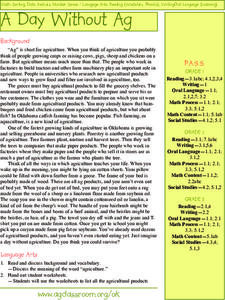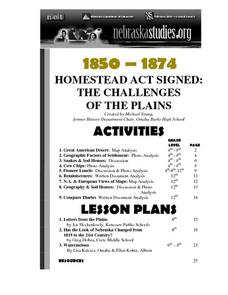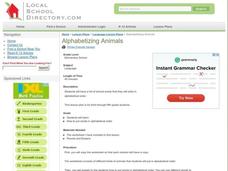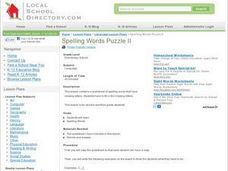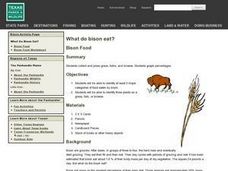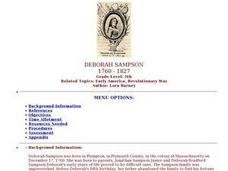Curated OER
Characteristics of Living Things: What Makes Them Tick
Students list the characteristics of living things and give specific examples of living things exhibiting these characteristics. They bring in examples of living things.
Curated OER
Name It Cotton
Students identify products that are made from cotton. They participate in an activity in which a cotton ball is thrown to them and in turn they must name a product made from cotton.
Curated OER
Intro. To Native American Unit
High schoolers, to help themselves better explain the idea of Native Americans and their oral traditions, play the whisper down the line game and analyze the outcomes.
Curated OER
Milk: A Practical Application
Students examine the impact of the physical and chemical properties of milk and its use as an important food.
Curated OER
Food and You
Students examine the types of foods they eat. They describe the different components and resources that go into making their favorite foods. They also compare the resources going into different foods and identify ones which are more...
Curated OER
Agriculture
Young scholars examine the types of agriculture in their own state and in their local community. They examine how food makes it to their local grocery store. They compare data from different states.
Curated OER
Tanabata: The Japanese "Wish Upon a Star"Festival
High schoolers research the legend of Tanabata in order to explain some of the astronomical findings in the night sky. The Japanese tell the story in order to explain the origin of celestial bodies.
Curated OER
Flower Power
Students view examples of Robert Harris' artwork to identify and describe the ecosystems in them. In groups, they work together to discuss how ecosystems breakdown and create solutions to keep this from happening. To end the lesson,...
Curated OER
Creating and Acting Mammal Stories
Fifth graders write and perform stories on mammals. They review the parts of a narrative story and write stories. They rehearse their stories and present them to the class. They make mammal cookies after their peformance.
Curated OER
A Day Without Ag
Students investigate the concept of agriculture. They focus upon the presence of agriculture and the personal implications of it. Students generate lists related to the concept to encourage group discussions. The products of agriculture...
Curated OER
A Trip To the Animal Fair
Students share their experiences they have had with animals. Using photographs of their own pets, they create a booklet out of construction paper in which they identify the pets needs. They also compare and contrast what they need to...
Curated OER
Watermelons
Students discover the origins and different uses of watermelons. Using the internet, they find photographs of the fruit and reading about them in primary source documents. As a class, they plan a community activity in which they use a...
Curated OER
Letters from the Plains
Eighth graders read and analyze primary source documents dealing with Nebraska history. In a role-play, they present the information they gathered to their classmates. They examine what live was like for people settling in Nebraska.
Curated OER
Has the Look of Nebraska Changed from 1819 to the 21st Century?
Eighth graders examine and analyze maps of early Nebraska. Using the maps, they compare and contrast them to those of today and identifying how the area has changed over time. They complete a worksheet over the differences in the maps...
Curated OER
Work and Play: Today and Yesterday
First graders investigate the concept of play and work. They use primary and secondary resources in order to find the information of comparing the concepts in the context of the past to present day. Students brainstorm to find the...
Curated OER
Alphabetizing Animals
Students listen to an explanation of how to put words in alphabetical order with examples provided. Students complete the worksheet to alphabetize animal names independently.
Curated OER
Spelling Words Puzzle II
Learners receive instruction using examples to find missing letters in their spelling words. They fill in the blanks of each spelling word choosing from a list of animal names provided.
Curated OER
What do Bison Eat?
Middle schoolers identify the three major categories of food eaten by bison. In groups, they collect examples of grass and forbs and press them. They complete a chart of the percentages of each type of food the bison eat in a day. ...
Curated OER
Deborah Sampson
Fifth graders describe the major accomplishments of Deborah Sampson and her importance in American history. They list in chronological order the evets that took place in Deborah Sampson's life. They demonstrae their ability to...
Curated OER
"Honey Dew from Bunny Too!"
The students will design a lab to test the mechanism that triggers spore dispersal. They should have some clues after making observations of the life cycle. Part of the fun here is to let the students devise a method for testing this...
Curated OER
Unity In Diversity
Students discuss the meaning of diversity in the world. They practice how to act around others and appreciate the different types of people that exist. The lesson includes a section of vocabulary and the reading of a story to illustrate...
Curated OER
A Cat Nap
First graders recognize the short vowel A in written and spoken language. Through matching activities, they discriminate the short vowel /a/ from other phonemes. Students associate the phoneme with its letter representation and read...
Curated OER
Creaky Door E
Students recognize the short vowel "E" in written and spoken language. Through matching activities, they discriminate the short vowel /e/ from other phonemes. Students associate the phoneme with its letter representation and fill in the...
Curated OER
Pick-A-Phonic Picture Books
Learners explore phonemes. They create a picture book when a new phoneme is introduced. Students discuss the new phoneme and words that contain the phoneme. They create phoneme books shaped like the phoneme being studied. They illustrate...
Other popular searches
- Click Clack Moo Cows That Type
- Dairy Cows
- Cows Milk
- Clipart Cows
- Animal Anatomy Cows
- Cows Carbon Dioxide
- Clip Art Cows
- Cows Word Search
- Activities About Cows
- Milking Cows
- Five Dairy Cows
- Art and Cows


